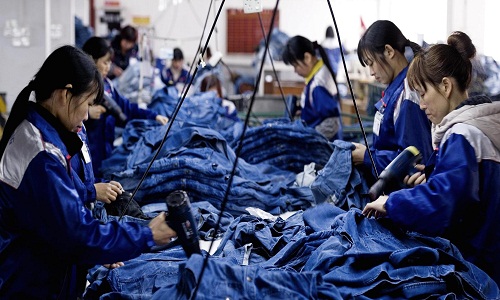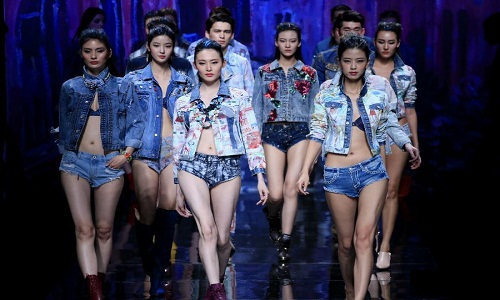"China’s economy is facing tough times with the yuan depreciating against other currencies especially US dollar. The slowdown is also affecting China’s denim manufacturing town of Guangdong. What price are you willing to give? This is common question asked by traders in the ‘denim capital’ nowadays as merchants shrug off and walk away from them. Business is getting harder in the International Jeans City mall Guangzhou in China’s Guangdong province."

China’s economy is facing tough times with the yuan depreciating against other currencies especially US dollar. The slowdown is also affecting China’s denim manufacturing town of Guangdong. What price are you willing to give? This is common question asked by traders in the ‘denim capital’ nowadays as merchants shrug off and walk away from them. Business is getting harder in the International Jeans City mall Guangzhou in China’s Guangdong province.
Slow sales dampens business

Visiting merchants are in no rush to seal a deal. Sales staff far outnumber customers at malls and merchants are the only foreign buyers present. Domestic sales are weak and export orders have almost disappeared altogether. The pressure on traders in Xintang is almost palpable. The grimy riverside town has been through a lot, from deadly water pollution to tensions between local and migrant workers that culminated in violent anti-police riots in 2011.
China’s plan to climb the value chain makes the road ahead for Xintang all the more arduous. Even as the country ‘follows the classic path of moving up the value chain’ as Japan, Korea and Hong Kong have done, the risks of getting caught in a middle-income trap are rising, says Stanford University professor Ian Morris.
In the late 19th century, Germany and the United States invented ‘whole new forms of production and management’ to overtake Britain. The question for China was ‘whether it can repeat that achievement in the early 21st century,’ wrote Morris, the author of Why the West Rules – For Now in an email.
China’s GDP growth has slowed to its lowest level in a quarter of a century. Its exports, once a pillar underpinning the country’s economic miracle, declined last year for the first time since 2009. It was the second such annual fall since late leader Deng Xiaoping opened the Chinese economy to the outside world. 
As Wei Jianguo, a former commerce vice-minister whose portfolio covered foreign trade says, exports are facing a dangerous time and exporters are struggling to find enough orders. Wei is now general secretary of a government think tank, the China Centre for International Economic Exchanges.
Orders for China’s low-end products are set to continue falling as costs rise and competitiveness drops. Chinese business owners, in particular those in the Pearl River Delta region, know they can no longer rely on cheap labour and land supply, said Bai Ming, a researcher with the Commerce Ministry.
The rice bowl is not there anymore; business owners have to find a new one from better technology and management. But it can’t be done overnight, Bai said. Even though, it is important for China to maintain the country’s massive job market and social stability, labour-intensive manufacturing is not the future for China’s economy.
During the global financial crisis in 2008 when nearly 20 million migrant workers were laid off, then premier Wen Jiabao was so concerned that he launched a 4-trillion-yuan fiscal stimulus package to boost growth. The move left a pile of unpaid debt and excess industrial capacity.
Perhaps, it is time for China to improve its technology and labour management systems.












